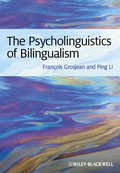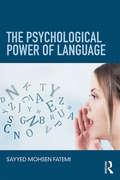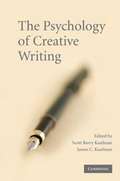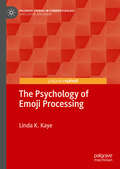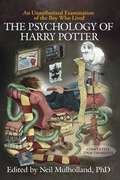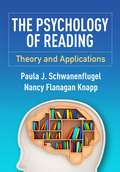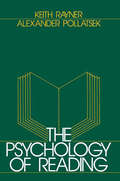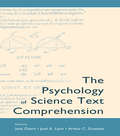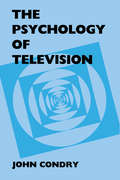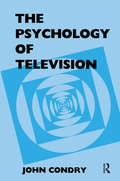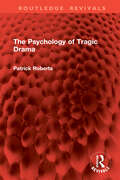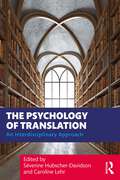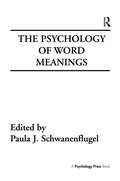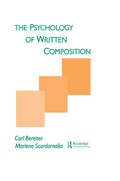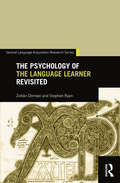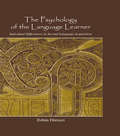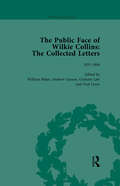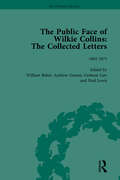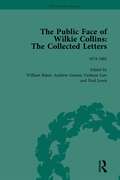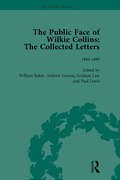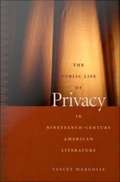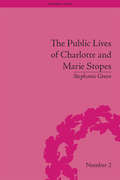- Table View
- List View
The Psycholinguistics of Bilingualism
by Ping Li François GrosjeanThe Psycholinguistics of Bilingualism presents a comprehensive introduction to the foundations of bilingualism, covering language processing, language acquisition, cognition and the bilingual brain. This thorough introduction to the psycholinguistics of bilingualism is accessible to non-specialists with little previous exposure to the field Introduces students to the methodological approaches currently employed in the field, including observation, experimentation, verbal and computational modelling, and brain imaging Examines spoken and written language processing, simultaneous and successive language acquisition, bilingual memory and cognitive effects, and neurolinguistic and neuro-computational models of the bilingual brain Written in an accessible style by two of the field’s leading researchers, together with contributions from internationally-renowned scholars Featuring chapter-by-chapter research questions, this is an essential resource for those seeking insights into the bilingual mind and our current knowledge of the cognitive basis of bilingualism
The Psychological Power of Language
by Sayyed Mohsen FatemiThis volume shows how the psychology and power of language can create realities. It examines the psychological implications of language as a way of being and not just as an instrument of communication. It discusses how a shift in language gives rise to an existential transformation, and shows how creative modes of expression lead to a radical transformation of beings. Throughout, both the theoretical and practical implications of the psychological power of language are presented, particularly how language may result in a healthier inter- and intrapersonal world. It will interest upper-level students and researchers of language in Psychology, Linguistics, Philosophy and Education, as well as professional counselors.
The Psychologist's Companion
by Robert J. Sternberg Karin SternbergThe Psychologist's Companion is intended for students as well as young professionals and writers at all stages of their careers seeking inspiration and guidelines for better scientific writing. This book is also a resource for researchers in related fields. It has been comprehensively updated, revised, and extended for its fifth edition and includes the latest style guidelines of the American Psychological Association's Publication Manual (sixth edition, 2009) as well as chapters encompassing the entire research process from doing literature research and planning an experiment to writing the paper. It features new chapters on literature research; ethics; and generating, evaluating, and selling ideas. The Psychologist's Companion also provides information on writing book proposals, grant proposals, and lectures.
The Psychologist’s Companion
by Karin Sternberg Robert J. SternbergThe Psychologist's Companion is intended for students as well as young professionals and writers at all stages of their careers seeking inspiration and guidelines for better scientific writing. This book is also a resource for researchers in related fields. It has been comprehensively updated, revised, and extended for its fifth edition and includes the latest style guidelines of the American Psychological Association's Publication Manual (sixth edition, 2009) as well as chapters encompassing the entire research process from doing literature research and planning an experiment to writing the paper. It features new chapters on literature research; ethics; and generating, evaluating, and selling ideas. The Psychologist's Companion also provides information on writing book proposals, grant proposals, and lectures.
The Psychology of Creative Writing
by Scott Barry Kaufman James C. KaufmanThe Psychology of Creative Writing takes a scholarly, psychological look at multiple aspects of creative writing, including the creative writer as a person, the text itself, the creative process, the writer's development, the link between creative writing and mental illness, the personality traits of comedy and screen writers, and how to teach creative writing. This book will appeal to psychologists interested in creativity, writers who want to understand more about the magic behind their talents, and educated laypeople who enjoy reading, writing, or both. From scholars to bloggers to artists, The Psychology of Creative Writing has something for everyone.
The Psychology of Emoji Processing (Palgrave Studies in Cyberpsychology)
by Linda K. KayeThis book draws together the scientific research on how we process and interpret emoji. Most books on the subject of emoji explain how we use emoji and the functions they serve for the sender, but very do very little to address the receiver’s perspective. Seeking to redress this, this book extracts insights from a range of psychology sub-disciplines to provide a comprehensive review of current research on how we process emoji. The book also includes recommended theoretical frameworks and methodologies to help researchers in this area to strengthen their research, as a way of helping advance the research field on this fascinating topic.
The Psychology of Harry Potter: An Unauthorized Examination Of The Boy Who Lived
by Neil MulhollandHarry Potter has provided a portal to the wizarding world for millions of readers, but an examination of Harry, his friends and his enemies will take us on yet another journey: through the psyche of the Muggle (and wizard!) mind. The twists and turns of the series, as well as the psychological depth and complexity of J. K. Rowling&’s characters, have kept fans enthralled with and puzzling over the many mysteries that permeate Hogwarts and beyond: Do the Harry Potter books encourage disobedience? Why is everyone so fascinated by Professor Lupin? What exactly will Harry and his friends do when they finally pass those N.E.W.T.s? Do even wizards live by the ticking of the clock? Is Harry destined to end up alone? And why did it take Ron and Hermione so long to get together? Now, in The Psychology of Harry Potter, leading psychologists delve into the ultimate Chamber of Secrets, analyzing human mind and motivation by examining the themes and characters that make the Harry Potter books the bestselling fantasy series of all time. Grab a spot on the nearest couch, and settle in for some fresh revelations about our favorite young wizard!
The Psychology of Reading
by PhD Paula J. Schwanenflugel Nancy Flanagan KnappIncorporating cognitive, neuropsychological, and sociocultural perspectives, this authoritative text explains the psychological processes involved in reading and describes applications for educational practice. The book follows a clear developmental sequence, from the impact of the early family environment through the acquisition of emergent literacy skills and the increasingly complex abilities required for word recognition, reading fluency, vocabulary growth, and text comprehension. Linguistic and cultural factors in individual reading differences are examined, as are psychological dimensions of reading motivation and the personal and societal benefits of reading. Pedagogical Features: *End-of-chapter discussion questions and suggestions for further reading. *Explicit linkages among theory, research, standards (including the Common Core State Standards), and instruction. *Engaging case studies at the beginning of each chapter. *Technology Toolbox features exploring the pros and cons of computer-assisted learning.
The Psychology of Reading: A Special Issue Of The European Journal Of Cognitive Psychology (Oxford Library Of Psychology)
by Keith Rayner Alexander PollatsekThe last 20 years have witnessed a revolution in reading research. Cognitive psychologists, using high-speed computers to aid in the collection and analysis of data, have developed tools that have begun to answer questions that were previously thought unanswerable. These tools allow for a "chronometric," or moment-to-moment, analysis of the reading process. Foremost among them is the use of the record of eye movements to help reveal the underlying perceptual and cognitive processes of reading. This volume provides a coherent framework for the research accomplished on the reading process over the past 15 years. It emphasizes how readers go about extracting information from the printed page and how they comprehend the text.
The Psychology of Science Text Comprehension
by Arthur C. Graesser José Otero José A. LeónThis volume's goal is to provide readers with up-to-date information on the research and theory of scientific text comprehension. It is widely acknowledged that the comprehension of science and technological artifacts is very difficult for both children and adults. The material is conceptually complex, there is very little background knowledge for most individuals, and the materials are often poorly written. Therefore, it is no surprise that students are turned off from learning science and technology. Given these challenges, it is important to design scientific text in a fashion that fits the cognitive constraints of the learner. The enterprise of textbook design needs to be effectively integrated with research in discourse processing, educational technology, and cognitive science. This book takes a major step in promoting such an integration. This volume: *provides an important integration of research and theory with theoretical, methodological, and educational applications; *includes a number of chapters that cover how science text information affects mental representations and strategies; *introduces important suggestions about how text design and new technologies can be thought of as pedagogical features; and *establishes academic text taxonomies and a consensus of the criteria to organize inferences and other mental mechanisms.
The Psychology of Television
by John CondryThis volume addresses the content of television -- both programs and advertisements -- and the psychological effects of the content on the audience. The author not only reports new research, but explains its practical applications without jargon. Issues are discussed and described in terms of psychological mechanisms and causal routes of influence. While primarily referring to the American television industry and American governmental regulations, the psychological principles discussed are applicable to television viewers world wide.
The Psychology of Television
by John CondryThis volume addresses the content of television -- both programs and advertisements -- and the psychological effects of the content on the audience. The author not only reports new research, but explains its practical applications without jargon. Issues are discussed and described in terms of psychological mechanisms and causal routes of influence. While primarily referring to the American television industry and American governmental regulations, the psychological principles discussed are applicable to television viewers world wide.
The Psychology of Tragic Drama (Routledge Revivals)
by Patrick RobertsFirst published in 1975, The Psychology of Tragic Drama offers an interpretation of some of the themes of both ancient and modern tragic drama through an investigation of the plays in the light of psychoanalytical ideas.In his introduction, the author explains and defends the application of psychoanalytical insights to the study of literature. Then in the first part of the book, he proceeds to an exploration of some primitive and infantile situations expressed in Euripides’ Bacchae and in a group of modern dramas by Strindberg, Pinter, Ionesco and Weiss. In the second part he turns to the drama of Aeschylus, Sophocles and Euripides, tracing the psychological history of Orestes and Electra from their Greek originals to their later re-creations in more modern settings, in the plays of O’Neill, Eliot and Sartre, and comparing the treatment of themes and motifs which also reappear in Macbeth and Hedda Gabler. In conclusion, Patrick Roberts discusses the loss and gain involved in the diffused awareness among modern dramatists of psychoanalytical ideas and influence; indeed, the book as a whole stands as a confirmation and expansion of Freud’s comment ‘that poets and philosophers before me discovered the unconscious’. As such, it will appeal not only to all students of serious drama but to all those interested in the two disciplines of literature and psychoanalysis.
The Psychology of Translation: An Interdisciplinary Approach
by Séverine Hubscher-Davidson Caroline LehrDrawing on work from scholars in both psychology and translation studies, this collection offers new perspectives on what Holmes (1972) called ‘translation psychology’. This interdisciplinary volume brings together contributions addressing translation from the vantage point of different applied branches of psychology, including critical-developmental psychology, occupational psychology, and forensic psychology. Current theoretical and methodological practices in these areas have the potential to strengthen and diversify how translators’ decision-making and problem-solving behaviours are understood, but many sub-branches of psychology have lacked visibility so far in the translation studies literature. The Psychology of Translation: An Interdisciplinary Approach therefore seeks to expand our understanding of translator behaviour by bringing to the fore new schools of thought and conceptualisations. Some chapters report on empirical studies, while others provide a review of research in a particular area of psychology of relevance to translation and translators. Written by a range of leading figures and authorities in psychology and translation, it offers unique contributions that can enrich translation process research and provide a means of encouraging further development in the area of translation psychology. This book will be of interest to scholars working at the intersection of translation and psychology, in such fields as translation studies, affective science, narrative psychology, and work psychology, amongst other areas. It will be of particular interest to researchers and postgraduate students in translation studies.
The Psychology of Word Meanings (Cog Studies Grp of the Inst for Behavioral Research at UGA)
by Paula J. SchwanenflugelThis volume contains perspectives from a collection of cognitive scientists on the psychological, philosophical, and educational issues surrounding the meanings of words and how these meanings are learned and accessed. It features chapters covering the nature and structure of word meaning, how new word meanings are acquired in childhood and later on in life, and how research in word processing may tell us something about the way in which word meanings are represented and how they relate to the language processor.
The Psychology of Written Composition (Psychology of Education and Instruction Series)
by Carl Bereiter Marlene ScardamaliaFirst Published in 1987. Routledge is an imprint of Taylor & Francis, an informa company.
The Psychology of the Language Learner Revisited (Second Language Acquisition Research Series)
by Zoltan Dornyei Stephen RyanOver the past decade, the focus of inquiry into the psychology of SLA has shifted from the analysis of various characteristics within individuals towards a greater consideration of individuals’ dynamic interactions with diverse contexts. This revisit of the bestselling The Psychology of the Language Learner reflects on these developments by challenging some of the assumptions upon which the original text was based, maintaining the familiar structure of the original, while situating the discussion within a very different theoretical framework. Written in a lively, accessible style, the book considers how the field has evolved and maintains a keen eye on the future, suggesting exciting new directions for the psychology of SLA. The Psychology of the Language Learner Revisited will appeal to students and researchers in a wide range of disciplines, including applied linguistics, second language acquisition, modern languages, and psychology.
The Psychology of the Language Learner: Individual Differences in Second Language Acquisition (Second Language Acquisition Research Series)
by Zoltán DörnyeiResearch results over the past decades have consistently demonstrated that a key reason why many second language learners fail--while some learners do better with less effort--lies in various learner attributes such as personality traits, motivation, or language aptitude. In psychology, these attributes have traditionally been called "individual differences." The scope of individual learner differences is broad--ranging from creativity to learner styles and anxiety--yet there is no current, comprehensive, and unified volume that provides an overview of the considerable amount of research conducted on various language learner differences, until now.Each chapter in this new volume focuses on a different individual difference variable. Besides a review of the relevant second language literature, Zoltán Dörnyei presents a concise overview of the psychological research involving each topic. A key concern for the author has been to define the various learner factors as measurable constructs and therefore the discussion includes a summary of the most famous tests and questionnaires in each domain.A wide range of readers will benefit from this book--students in linguistics, applied linguistics, modern languages, and psychology programs; second language teachers participating in in-service training courses; and researchers in second language acquisition and psychology.
The Public Face of Wilkie Collins Vol 1: The Collected Letters
by William Baker Graham Law Andrew GassonThe editors have transcribed 2,500 of Wilkie Collins's letters, around 700 of them previously unidentified, and have given them all a full scholarly annotation and context. The letters shed light on the personal life and business activities of this creative Victorian personality.
The Public Face of Wilkie Collins Vol 2: The Collected Letters
by William Baker Graham Law Andrew GassonThe editors have transcribed 2,500 of Wilkie Collins's letters, around 700 of them previously unidentified, and have given them all a full scholarly annotation and context. The letters shed light on the personal life and business activities of this creative Victorian personality.
The Public Face of Wilkie Collins Vol 3: The Collected Letters
by William Baker Graham Law Andrew GassonThe editors have transcribed 2,500 of Wilkie Collins's letters, around 700 of them previously unidentified, and have given them all a full scholarly annotation and context. The letters shed light on the personal life and business activities of this creative Victorian personality.
The Public Face of Wilkie Collins Vol 4: The Collected Letters
by William Baker Graham Law Andrew GassonThe editors have transcribed 2,500 of Wilkie Collins's letters, around 700 of them previously unidentified, and have given them all a full scholarly annotation and context. The letters shed light on the personal life and business activities of this creative Victorian personality.
The Public Intellectual and the Culture of Hope
by Joel Faflak Jason HaslamThe Public Intellectual and the Culture of Hope brings together a number of winners of the Polanyi Prize in Literature - a group whose research constitutes a diversity of methodological approaches to the study of culture - to examine the rich but often troubled association between the concepts of the public, the intellectual (both the person and the condition), culture, and hope. The contributors probe the influence of intellectual life on the public sphere by reflecting on, analyzing, and re-imagining social and cultural identity.The Public Intellectual and the Culture of Hope reflects on the challenging and often vexed work of intellectualism within the public sphere by exploring how cultural materials - from foundational Enlightenment writings to contemporary, populist media spectacles - frame intellectual debates within the clear and ever-present gaze of the public writ large. These serve to illuminate how past cultures can shed light on present and future issues, as well as how current debates can reframe our approaches to older subjects.
The Public Life of Privacy in Nineteenth-Century American Literature
by Stacey MargolisStacey Margolis rethinks a key chapter in American literary history, challenging the idea that nineteenth-century American culture was dominated by an ideology of privacy that defined subjects in terms of their intentions and desires. She reveals how writers from Nathaniel Hawthorne to Henry James depicted a world in which characters could only be understood--and, more importantly, could only understand themselves--through their public actions. She argues that the social issues that nineteenth-century novelists analyzed--including race, sexuality, the market, and the law--formed integral parts of a broader cultural shift toward understanding individuals not according to their feelings, desires, or intentions, but rather in light of the various inevitable traces they left on the world. Margolis provides readings of fiction by Hawthorne and James as well as Susan Warner, Mark Twain, Charles Chesnutt, and Pauline Hopkins. In these writers' works, she traces a distinctive novelistic tradition that viewed social developments--such as changes in political partisanship and childhood education and the rise of new politico-legal forms like negligence law--as means for understanding how individuals were shaped by their interactions with society. The Public Life of Privacy in Nineteenth-Century American Literature adds a new level of complexity to understandings of nineteenth-century American culture by illuminating a literary tradition full of accidents, mistakes, and unintended consequences--one in which feelings and desires were often overshadowed by all that was external to the self.
The Public Lives of Charlotte and Marie Stopes (Dramatic Lives #2)
by Stephanie GreenCharlotte Stopes was the first woman in Scotland to get a university qualification. She devoted her life to studying Shakespeare and the promotion of women in public life. Though Charlotte is largely forgotten, her daughter Marie is well known. Green asserts that Marie’s success can only be understood in relation to the achievements of her mother.
